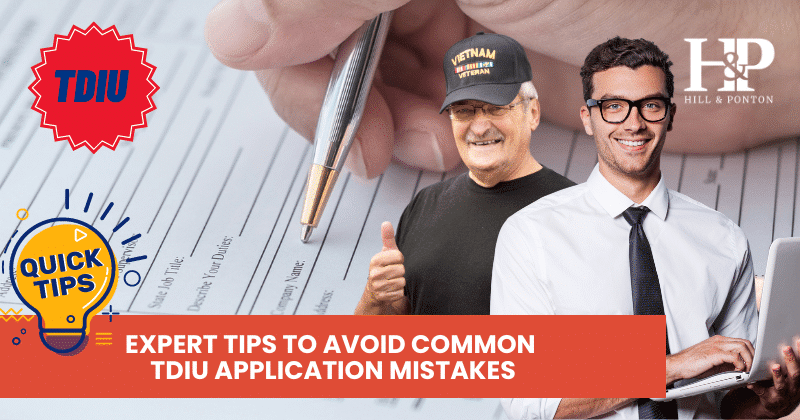Are you aware of the Total Disability Individual Unemployability (TDIU) benefits offered by the Department of Veterans Affairs (VA)?
These benefits provide financial support at the 100 percent disability rate for veterans who are unable to secure and maintain substantially gainful employment due to service-connected disabilities.
However, when it comes to applying for TDIU, it’s crucial to steer clear of common mistakes that could hinder your chances of receiving the benefits you deserve.
In this blog post, we will walk you through five key mistakes to avoid when filing TDIU claims.
Whether you’re just starting your application journey or have faced setbacks in the past, this guide will help you navigate the process with confidence.
By understanding and sidestepping these pitfalls, you can enhance your chances of a successful TDIU claim and unlock the benefits that can make a positive impact on your life.
Mistake #1: Insufficient Medical Evidence
When applying for Total Disability Individual Unemployability (TDIU) benefits, one of the most critical mistakes to avoid is providing insufficient medical evidence.
The VA requires detailed documentation to support your claim and establish the connection between your service-connected disabilities and your inability to maintain substantial employment.
Insufficient medical evidence can weaken your TDIU claim and result in delays or denials.
The VA needs comprehensive information about your disabilities and their impact on your ability to work.
Without this evidence, it becomes challenging for them to assess the severity and limitations caused by your service-connected conditions.
H&P Expert Tips to Help Avoid This Happening to You!
To avoid this mistake and strengthen your TDIU claim, follow these tips:
- Request Complete Medical Records: Contact all relevant healthcare providers and request a copy of your complete medical records. Ensure that your records include all relevant diagnoses, treatments, and test results related to your service-connected disabilities.
- Seek Supporting Statements: Schedule appointments with your treating physicians or specialists and explain the purpose of your TDIU claim. Request written statements from them that clearly describe how your disabilities impact your ability to secure and maintain substantially gainful employment.
- Obtain Disability Benefits Questionnaires (DBQs): Check the VA’s website for Disability Benefits Questionnaires related to your specific disabilities. Bring these forms to your appointments with your healthcare providers, and ask them to complete the DBQs accurately and thoroughly.
By gathering comprehensive medical evidence and opinions, you provide the VA with a clear picture of how your service-connected disabilities affect your employability.
This evidence significantly strengthens your TDIU claim and increases your chances of a successful application.
Remember, medical evidence is the cornerstone of your TDIU claim.
Investing time and effort into obtaining detailed records and expert opinions is crucial to demonstrating the severity of your disabilities and their impact on your ability to work.
Mistake #2: Lack of Documentation for Work History
When filing for Total Disability Individual Unemployability (TDIU) benefits, it’s essential to avoid the mistake of lacking sufficient documentation for your work history.
Establishing the impact of your service-connected disabilities on your past employment is crucial in demonstrating your eligibility for TDIU.
The VA needs evidence to understand how your disabilities have affected your ability to maintain substantial gainful employment in the past.
Without proper documentation of your work history, it becomes challenging to establish the correlation between your disabilities and your employment limitations.
H&P Expert Tips to Avoid This Happening to You!
To ensure you have sufficient documentation for your work history, consider the following tips:
- Gather Employment Records: Take the time to collect employment records, including W-2 forms, pay stubs, or tax returns, from your previous jobs. These documents provide concrete evidence of your work history, income, and employment duration.
- Obtain Job Descriptions: Reach out to your former employers and request job descriptions for the positions you held. These descriptions should outline the specific duties, responsibilities, and physical requirements associated with each job.
- Seek Performance Evaluations or Statements: If you have access to performance evaluations from previous employers, include them in your TDIU application. Alternatively, ask supervisors or coworkers who witnessed your work limitations due to your disabilities to provide written statements supporting your claim.
By providing comprehensive documentation of your work history, you offer the VA a clear understanding of your employment background and the ways in which your disabilities impacted your ability to perform essential job tasks.
This evidence strengthens your TDIU claim by illustrating the correlation between your service-connected disabilities and your work limitations.
A well-documented work history can significantly enhance your TDIU claim.
Take the time to gather all relevant records, job descriptions, and performance evaluations to provide a comprehensive picture of your past employment and demonstrate the impact of your disabilities.
Mistake #3: Failure to Meet the Rating Criteria
One critical mistake to avoid when filing for Total Disability Individual Unemployability (TDIU) benefits is failing to meet the rating criteria set by the Department of Veterans Affairs (VA).
Understanding and meeting the minimum disability rating thresholds are essential for establishing your eligibility for TDIU.
To qualify for TDIU, you must meet specific rating requirements.
The VA assigns disability ratings to each of your service-connected conditions based on the severity of the impairment.
These ratings are expressed as a percentage, reflecting the extent to which the disability affects your overall functioning.
For TDIU eligibility, you must either have:
- one service-connected disability rated at 60 percent or higher, or
- a combination of service-connected disabilities with a combined rating of 70 percent or higher, along with at least one disability rated at 40 percent or higher.
Failing to meet these rating criteria can result in a denial of your TDIU claim.
It’s crucial to review your disability ratings and seek appropriate adjustments if they fall below the necessary thresholds.
H&P Expert Tips to Avoid This Happening to You!
To ensure you meet the rating criteria for TDIU, consider the following tips:
- Assess Your Current Disability Ratings: Review your current disability ratings provided by the VA. If you are unsure about your ratings or believe they may not accurately reflect the severity of your conditions, seek guidance from a veterans’ service organization or a VA-accredited claims agent. They can assist in evaluating your ratings and determining if adjustments are necessary.
- Request Reevaluation of Disability Ratings: If your disability ratings do not meet the TDIU requirements, you have the right to request a reevaluation. Submit new medical evidence, such as recent medical records or expert opinions, that support a higher disability rating. This evidence should clearly demonstrate the increased severity and impact of your service-connected conditions.
- Gather Additional Medical Evidence: Work with your treating physicians to gather any additional medical evidence that can support higher disability ratings. This may include updated test results, treatment records, or reports from specialists who can provide a comprehensive assessment of your disabilities.
By ensuring that your disability ratings meet the minimum thresholds required for TDIU, you enhance your chances of a successful claim.
It’s important to regularly review your ratings, request reevaluations when necessary, and provide the VA with the most accurate and up-to-date information regarding the severity of your service-connected disabilities.
Remember, take the time to evaluate your disability ratings, seek appropriate adjustments if needed, and gather additional medical evidence to support your case.
Mistake #4: Inadequate Explanation of Unemployability
Another mistake to avoid when filing for Total Disability Individual Unemployability (TDIU) benefits is providing an inadequate explanation of your unemployability.
It’s essential to clearly demonstrate to the Department of Veterans Affairs (VA) how your service-connected disabilities prevent you from securing and maintaining substantially gainful employment.
The VA needs a comprehensive understanding of the limitations and challenges you face due to your disabilities.
Simply stating that you are unable to work without providing detailed explanations may not be sufficient to support your TDIU claim.
It is crucial to provide a robust explanation of how your disabilities specifically impact your ability to perform work-related tasks.
H&P Expert Tips to Avoid This Happening to You!
To avoid the mistake of inadequate explanation of unemployability, consider the following tips:
- Personalize Your Statement: Craft a personal statement that articulates the specific challenges you face due to your disabilities. Use clear and concise language to convey how these limitations directly impact your ability to secure and maintain substantially gainful employment.
- Provide Concrete Examples: Offer specific examples of tasks or work settings that are problematic for you due to your disabilities. Use real-life experiences to illustrate the challenges you encounter and how they hinder your ability to perform job-related duties effectively.
- Consult Vocational Experts: Seek advice from vocational experts or employment specialists who can evaluate your employability based on your disabilities. Incorporate their professional opinions and analysis into your TDIU application to reinforce your case.
The VA needs a clear understanding of how your service-connected disabilities directly impact your ability to secure and maintain substantially gainful employment.
Mistake #5: Missing the Deadline or Filing Incorrect Forms
One crucial mistake to avoid when filing for Total Disability Individual Unemployability (TDIU) benefits is missing the deadline or filing incorrect forms.
Adhering to the Department of Veterans Affairs (VA) deadlines and using the correct forms is essential to ensure that your TDIU claim is processed accurately and on time.
The VA has specific deadlines and requirements for submitting TDIU claims.
Failing to meet these deadlines or using incorrect forms can lead to unnecessary delays or even the denial of your benefits.
It is crucial to familiarize yourself with the VA’s guidelines and ensure that you complete and submit all necessary paperwork correctly.
H&P Expert Tips to Avoid This Happening to You!
To avoid missing deadlines or filing incorrect forms, consider the following tips:
- Organize Your Timeline: Create a timeline or checklist that outlines the various deadlines associated with your TDIU claim. This ensures that you stay organized and submit your application on time.
- Double-Check Your Forms: Before submitting your TDIU claim, carefully review all the forms to ensure that they are accurate, complete, and up-to-date. Cross-reference with the VA’s guidelines to ensure you are using the correct forms for your application.
- Seek Professional Assistance: If you have any doubts or concerns about the deadlines or forms, reach out to a veterans’ service organization or a VA-accredited claims agent. Their expertise and guidance can help you navigate the process and avoid any mistakes.
By adhering to the VA’s deadlines and using the correct forms, you ensure that your TDIU claim is processed smoothly and efficiently.
Following these guidelines can prevent unnecessary delays or denials and help you receive the benefits you deserve.
Filing for Total Disability Individual Unemployability (TDIU) benefits can be a complex process, but by avoiding common mistakes, you can increase your chances of a successful claim.
Remember, seeking guidance from veterans’ service organizations or VA-accredited claims agents can provide valuable support throughout the application process.
With proper preparation and attention to detail, you can navigate the TDIU claim process with confidence and achieve the financial support you need.
Did you find this guide useful? Want more great info about filing disability claims?
If you are interested in learning more about filing for disability benefits, check out our FREE ebook The Road to VA Compensation Benefits .





